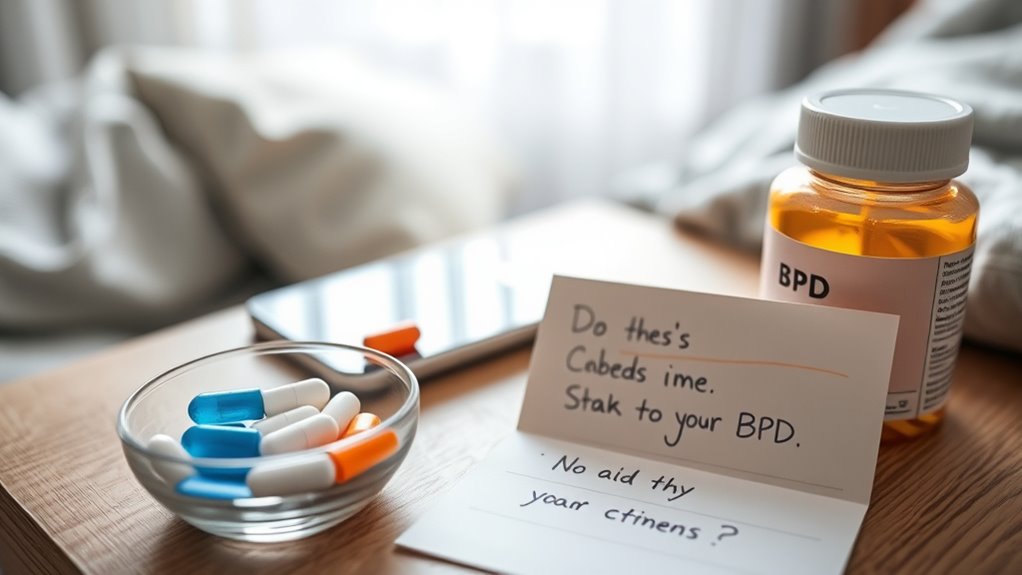When discussing medication for BPD, it’s important to understand that these drugs help manage symptoms like mood swings, impulsivity, and depression but don’t cure the disorder. Ask your clinician about the goals, potential side effects, and how each medication functions. Always report any concerns or changes promptly. Regular check-ins ensure adjustments for your safety and comfort. Knowing what to ask empowers you, and exploring more can help you make informed decisions for your treatment journey.
Key Takeaways
- Understand that medications target specific symptoms like mood swings and impulsivity, not a cure for BPD itself.
- Always discuss your treatment goals and expected outcomes with your clinician before starting or adjusting medications.
- Report any side effects, mood changes, or new symptoms promptly to ensure safe and effective medication management.
- Keep an updated list of all medications and supplements to avoid harmful interactions and inform your healthcare provider.
- Collaborate actively with your clinician by asking questions, expressing concerns, and adjusting treatment plans for optimal symptom relief.

Managing medication for borderline personality disorder (BPD) can be challenging, as no single drug is specifically approved to treat the core symptoms. Instead, medications are typically used to target specific issues like mood swings, impulsivity, or depression, and their effectiveness varies from person to person. Because of this, it’s vital to work closely with your clinician to develop a tailored approach that addresses your unique needs. When you discuss medication options, ask your provider about the goals of each medication, how long it might take to see benefits, and what side effects you should watch for. Understanding these details can help you stay informed and make decisions that feel right for you.
Work closely with your clinician to tailor medication and understand expected effects and side effects.
Your clinician might recommend different types of medications depending on your symptoms. For mood instability, antidepressants such as selective serotonin reuptake inhibitors (SSRIs) might be prescribed. If impulsivity or aggression are prominent, mood stabilizers like lamotrigine or valproate could be suggested. In some cases, atypical antipsychotics, such as aripiprazole or olanzapine, are used to manage specific symptoms like paranoia or severe mood swings. It’s vital to remember that these medications are not cures but tools that, when combined with therapy, can help manage symptoms more effectively. Always ask your doctor why they’re recommending a particular medication and what they expect it to accomplish.
Medication management requires ongoing communication. You should inform your clinician about any side effects, changes in mood, or new symptoms you experience. Some side effects may diminish over time, but others might require adjustments or discontinuation. Never stop taking medication without consulting your provider, as abrupt discontinuation can cause withdrawal or worsen symptoms. Regular check-ins and honest conversations are vital for optimizing treatment and ensuring your safety.
Additionally, be aware that medications can interact with other drugs or supplements you might be taking. Make a list of all medications, including over-the-counter products, and share it with your healthcare provider. This transparency helps prevent adverse interactions and guarantees your treatment plan is safe. Keep track of how you feel on each medication and discuss your progress during appointments. Remember, medication is just one part of your overall treatment plan, which should include therapy, support networks, and self-care strategies.
Ultimately, understanding your medication options empowers you to participate actively in your treatment. Don’t hesitate to ask questions, express concerns, or request adjustments. Your clinician is there to support you, and working together can improve your quality of life despite the challenges of BPD.
Frequently Asked Questions
Are There Long-Term Risks Associated With BPD Medications?
Yes, there are potential long-term risks with BPD medications. You might experience side effects like weight gain, sedation, or changes in mood over time. It’s important to stay in regular contact with your clinician so they can monitor your progress and adjust your treatment if needed. While medications can help manage symptoms, always discuss concerns and potential risks with your healthcare provider to guarantee safe, effective treatment.
Can Medication Replace Psychotherapy for BPD Treatment?
No, medication can’t replace psychotherapy for BPD; think of medications as the scaffolding that supports your mental structure, but therapy is the blueprint that truly rebuilds it. Medications may help manage symptoms temporarily, but psychotherapy digs deep, addressing root causes and fostering lasting change. To truly heal, you’ll want both working in harmony—medications as your guiding compass and therapy as the map to your emotional landscape.
How Do I Know if My Medication Is Working?
You’ll know your medication is working when you notice fewer intense mood swings, less impulsivity, and improved relationships. You might feel calmer, more in control, and able to handle stress better. Keep track of your symptoms and discuss any changes with your clinician regularly. They’ll help determine if your medication is effective or if adjustments are needed. Remember, it can take time to see significant improvements.
Are There Side Effects Unique to BPD Medications?
Like a roller coaster from the 80s, BPD medications can have unique side effects. You might experience mood swings, emotional numbness, or dissociation, which are more common in BPD treatments. Some medications could also cause weight changes or sleep issues. It’s essential to stay in touch with your clinician, report new symptoms, and ask about any concerns. Remember, everyone’s response is different, so open communication is key to finding what works best.
What Should I Do if I Miss a Dose?
If you miss a dose, don’t panic. Check your medication instructions or contact your clinician for guidance. Usually, if it’s soon enough, you can take the missed dose when you remember. If it’s close to your next dose, skip the missed one and continue your regular schedule. Never double up doses without consulting your healthcare provider, as this can cause unwanted side effects or interactions.
Conclusion
As you navigate your journey with BPD, remember that medication is like a guiding compass through stormy seas—helping you find stability amid the chaos. Keep an open dialogue with your clinician, asking questions and sharing your experiences. With patience and the right support, you can start to see the horizon clear, revealing a path toward greater balance and hope. Trust yourself, and let each step bring you closer to calmer waters.









